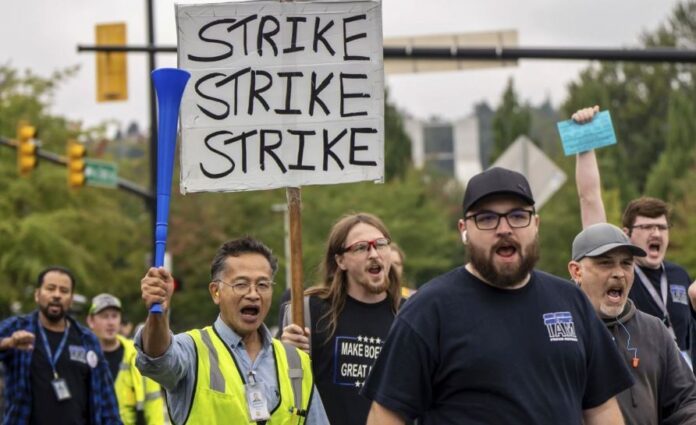In a decisive move early Friday morning, tens of thousands of Boeing machinists voted overwhelmingly to strike, rejecting a proposed agreement that would have significantly increased their pay and benefits but fell short of other key demands. Nearly 96 percent of the members of the International Association of Machinists and Aerospace Workers District 751 (IAM) supported the strike, far surpassing the two-thirds majority required to initiate the action.
IAM President Jon Holden announced the strike will commence at midnight Pacific Time, drawing enthusiastic cheers and chants of “Strike! Strike! Strike!” from the crowd at the Seattle union hall. Many workers displayed signs related to the walkout, signaling their strong discontent with the offer.
The strike represents a significant challenge for Boeing, which has struggled with a series of crises this year. Analysts estimate the walkout could cost the aerospace giant around $1 billion per week and disrupt its recovery efforts from ongoing financial and safety issues. The strike is expected to directly affect Boeing’s assembly plants in Washington, particularly in Everett and Renton, and could also impact its suppliers and market share.
Machinists, including long-time Boeing employee Charles Fromong, voiced frustration with the company. “We just want to be treated right, and they’re not doing it,” said Fromong, who has worked for Boeing for over 37 years.
The dispute follows a tentative four-year agreement announced on Sunday, which included a 25 percent pay increase and improved health and retirement benefits. The agreement also promised that Boeing would build its next new aircraft in Washington state, a major union demand. However, opposition grew quickly as workers rallied and criticized the offer on social media. A flier circulating at various plants urged members to reject the deal, and dissatisfaction was fueled by the elimination of the annual bonus program.
Workers expressed a desire for higher pay and longer contract terms, with some feeling the agreement did not adequately address past grievances or current economic pressures. “Four years is not enough to make up for the last 16,” said Roger Ligrano, a Boeing worker who voted to strike. “We need more time to understand the deal.”
Boeing CEO Kelly Ortberg attempted to salvage the agreement, appealing to employees to consider the future. “I hope you will choose the bright future ahead,” Ortberg said in a message to workers. “A strike would jeopardize our shared recovery, erode trust with customers, and impact our future together.”
The Biden administration, with Acting Labor Secretary Julie Su in contact with both parties, is closely monitoring the situation. Analysts are concerned about the potential duration of the strike and its implications for Boeing’s production and labor relations.
As the deadline approaches, the standoff highlights ongoing tensions between Boeing and its workforce, with many workers recalling previous negotiations and concessions made by the company.
Key Points
Overwhelming Vote for Strike: Nearly 96% of International Association of Machinists and Aerospace Workers District 751 (IAM) members voted to strike, far exceeding the two-thirds majority required.
Strike Timing: The walkout is set to begin at midnight Pacific Time.
Rejected Deal: The proposed agreement included a 25% pay increase and improved benefits but was rejected for not meeting all union demands.
Impact on Boeing: The strike could cost Boeing around $1 billion per week and disrupt operations at key assembly plants in Washington, potentially affecting suppliers and market share.
Worker Dissatisfaction: Workers expressed frustration with the deal, citing insufficient pay increases, the elimination of the annual bonus program, and a desire for longer contract terms.
Boeing’s Appeal: CEO Kelly Ortberg urged employees to accept the deal to avoid jeopardizing the company’s recovery and future operations.
Government Monitoring: The Biden administration, through Acting Labor Secretary Julie Su, is monitoring the situation.
Historical Context: The strike follows a series of crises for Boeing and a history of contentious negotiations involving concessions on pensions and production locations.



